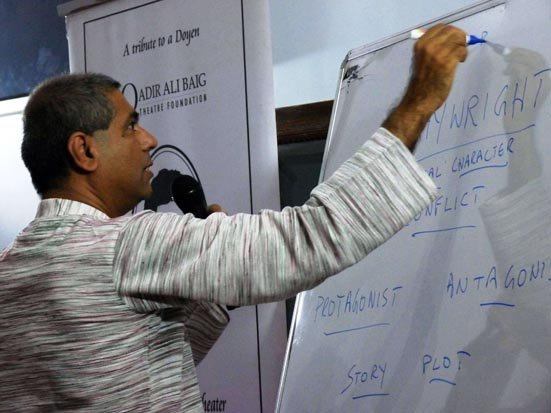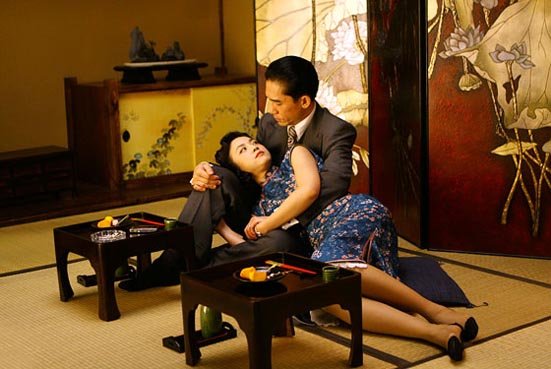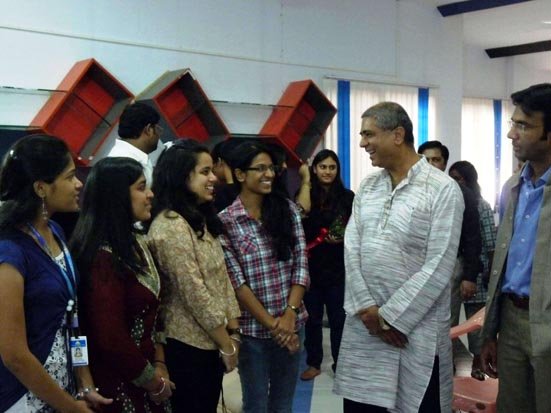
Mahesh Dattani is one of India’s premier theatre directors who has won several awards over the years. He’s even directed some films like Mango Souffle, Morning Raga (with Shabana Azmi) and Dance Like A Man. Sailesh Ghelani listens in on his keen insights into the world of theatre and imagination.
You started off as a copywriter in an ad agency, so did I! Did you just hate writing for irritating clients and client servicing people?
Yes! Absolutely! I lasted eight months I think. I just couldn’t deal with the fact that you are using your imagination to sell something.
You said somewhere that in a play it’s mostly about the actors whereas in a film it’s the director who is the main player. Is that because in a play you’re limited to a static stage? What can a director contribute to a play then?
In theatre, the rhythm, pace, the actors create all the energy on stage. Of course, a director helps create that space for the actors to perform in. The director helps the actors explore the text through a particular frame of reference. That frame of reference then becomes the actor’s space. But ultimately, the actors are on their own with the audience. No two performances can ever be alike. Whereas in film, the pace and movement of the story is determined by cuts and sequences, which are determined by the director. Film is a hugely technical medium requiring great contrivance. Without the director guiding the film with his or her vision, the creation can get completely subsumed by technology.
I must admit I haven’t seen your plays but they’re apparently about social issues. Seems very serious. Do you think that audiences are open to plays like that considering most want a night out with laughter and little mental masturbation?
My play Dance Like A Man has completed 400 shows all over the world and hundred of thousands have seen it. Whereas the film version was seen by hardly ten per cent of that. But you are right, the flavour of the day is amusement rather than sophisticated entertainment.

You’ve rightly said you can’t live off plays alone. So you do workshops. I’ve taken part in some myself and they involve a lot of physicality. What do you focus on in your sessions?
Here is an extract of what I do:
“The art of acting draws upon various levels of awareness that the actor must exercise simultaneously. It is the act of responding to stimulus that defines acting. At the same time the actor is creating a stimulus out of that response. Also, there are imaginary circumstances that the actor must internalize for that reaction to have any artistic truth!
In order to respond with sensitivity, depth and truthfulness, the actor’s instrument must be prepared to receive and react. The actor’s instrument is his body, imagination, intelligence and emotions! Masters both in the West and in India have formulated several techniques to develop the actor’s vocabulary. My workshop employs many of these important techniques along with his own to tune the actor’s instrument.
What a participant may expect to get out of this workshop: A four-week workshop does not purport to make actors out of its participants if they aren’t already. However, the participants – even those with stage experience- will definitely benefit with greater sensory awareness, better attuned to the spine as the seat of expression (rather than the amateur who uses facial expressions and hands alone), awareness of rhythmic patterns in character movement, psychological gestures, breaks in speech and movement patterns and a more complex and sensitive approach to the script. The workshop will culminate in a presentation with enactments of scenes written by the participants of the playwrights’ workshop.”
You had a play ‘Dance Like A Man’ that was made into a film, you’ve won a Sahitya Academy Award (the only English play to do so), and have been described as India’s finest English playwrights. What do you think you’re not that good at doing?
I am a terrible actor! And I can’t sing if my life depended on it!
Writing a play. I found that taking pen to paper and just letting loose is the best thing sometimes. What’s your technique?
Somewhat similar to yours. Although all good writing emerges from the re-writing.
How was it working with Shabana Azmi in the film Morning Raga (2004), which you wrote and directed?
It was quite an experience! It wasn’t easy though. She can be quite persistent in getting her way. But at the end of the day, she is an artiste and works towards her role, wanting to perfect every nuance. I would work with her again for sure.

Prakash Rao Kovelamudi, Shabana Azmi and Perizad Zorabian in Morning Raga
You’ve dealt with child sexual abuse in your plays. Is that an issue close to your heart due to a personal experience?
The play is a result of listening to six real stories. The play was commissioned by RAHI an NGO in Delhi who counsel survivors of childhood sexual abuse. When they approached me to write on the subject, I immediately said ‘yes’. They were helpful in putting me on to people who were happy to share their experiences with me.
Is sex tackled properly in Indian cinema or is it just a tool for getting some laughs?
Neither Hollywood nor Bollywood know anything about depicting sex. To me the best sexual scenes are in films like Ang Lee’s Lust, Caution and the short film The Hand by Wong Kar Wei.

Ang Lee's Lust, Caution
What’s the best play you’ve seen out of India?
I really like Roysten Abel’s work. Also some of Waman Kendre’s earlier work especially Zulwa. Recently, I loved Sunil Shanbaugh’s Stories in a Song.
Nowadays there are a lot of these actors preparing themselves for TV serials and Bollywood movies. Are they any good for theatre?
Theatre is a different medium and a difficult one for actors. Acting for the stage requires tremendous presence from the actor. The actor is involve in filling the space on stage just as he/she is involved in truthful expression of feelings. To be able to do both requires some training.
There are so many forms of performance cropping up like Improv Comedy, Open Mic nights and 10-minute play festivals nowadays. Any comments on those?
I think it’s great that there are so many forms of theatre now. About time. Improv comedy requires great skill and talent. Not anybody can do it well. Similarly, with short and sweet, it is a huge challenge to be able to put across a dramatic conflict-resolution within ten minutes. These are very special forms. I imagine they will get more and more popular.
Do you feel that classical has been sidelined for contemporary and popular art forms?
Not at all. I saw the Bandish festival recently, and the TATA theatre was filled to capacity. They attract different audiences.

Mahesh with his students
Is there a film you ever wanted to turn into a play? Best play to film adaptation you’ve seen…
Would love to do Sahib Biwi aur Ghulam as a play! One of the best film versions of a play I have seen recently is the cinematic transposition of Tambours sur la Digues (The Flood Drummers) by Ariane Mnchoukine and the famed actors of Theatru de soleil. The screening was part of the Prithvi film-screening program at Prithvi House. Mesmeric!
Read more interviews here.



0
comments